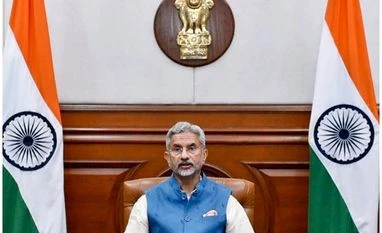India won't allow any unilateral attempt by China to alter LAC: Jaishankar
India will not allow any unilateral attempt by China to change the status quo or alter the Line of Actual Control (LAC), External Affairs Minister S Jaishankar said on Saturday,
)
External Affairs Minister S. Jaishankar
India will not allow any unilateral attempt by China to change the status quo or alter the Line of Actual Control (LAC), External Affairs Minister S Jaishankar said on Saturday, while asserting that through an enormous logistical effort, the country had countered the Chinese in eastern Ladakh.
Talking about the eastern Ladakh border row, Jaishankar said China, in violation of the 1993 and 1996 agreements not to mass troops on the LAC, chose to do so, and added that its attempt was obviously to unilaterally change the LAC.
"Even though we were in the midst of COVID-19 at that time, through an enormous logistical effort, which I think sometimes has not been adequately recognised by people, by analysts, even in our politics in this country, we were actually able to counter them at the LAC," Jaishankar said at a town hall organised by CNN-News18.
Elaborating on the row, he said some people have a simplistic idea of the border and one does not typically deploy at the patrolling point and that troops are in depth areas.
"What has happened as a result of this is because they (China) had forward deployments which were new and we counter-deployed, we also had forward deployments. You ended up with a very sort of intricate mix...which was very dangerous because they were too proximate, the rules of engagement were not being observed and then, exactly what we apprehended happened at Galwan two years ago. It became violent and there were casualties," Jaishankar said.
Also Read
"Since then, we have had a situation where we negotiate the friction points. When you say have you yielded results, many of those friction points have been resolved," he said.
"There are areas where they pulled back, we pulled back. Remember, both of us are very much in advance of what our pre-April positions were. Has it all been done? No. Have we made substantial solutions? Actually, yes," Jaishankar said.
"It is hard work. It is very patient work, but we are very clear on one point, which is, we will not allow any unilateral attempt by China to change the status quo or alter the LAC," he said.
"I do not care how long it takes, how many rounds we do, how hard we have to negotiate -- this is something we are very clear of," Jaishankar said.
He also said the talks with China have not come to an end.
The remarks came amid a standoff between India and China that began in early May of 2020. As a result of military talks, the two sides completed the disengagement process last year on the north and south banks of the Pangong lake and in the Gogra area.
India has been consistently maintaining that peace and tranquillity along the LAC are key for the overall development of the bilateral ties.
In his remarks at the town hall, Jaishankar also said India's history with the United States is a troubled one.
"A lot of our problems with Pakistan are directly attributable to the support which the United States gave to Pakistan," he added.
But today, there is a US that is able to take a long view, which is actually able to say "India has a different history with Russia and we have to take that into account", he said.
"Part of the reason why Quad has worked is that the four of us have given each other that degree of latitude and understanding," Jaishankar said.
India's history with Russia is different from the latter's history with the US, Japan or Australia, and everybody in the Quad does not have an identical position on everything, he said.
"Had it been the case, we would have expected everybody to have the same stand on Pakistan as ours," Jaishankar said.
(Only the headline and picture of this report may have been reworked by the Business Standard staff; the rest of the content is auto-generated from a syndicated feed.)
More From This Section
Don't miss the most important news and views of the day. Get them on our Telegram channel
First Published: Jun 18 2022 | 11:43 PM IST
